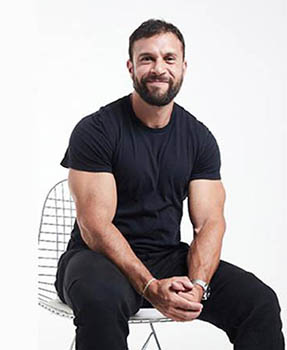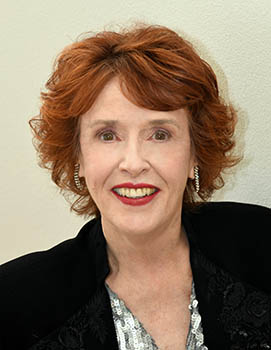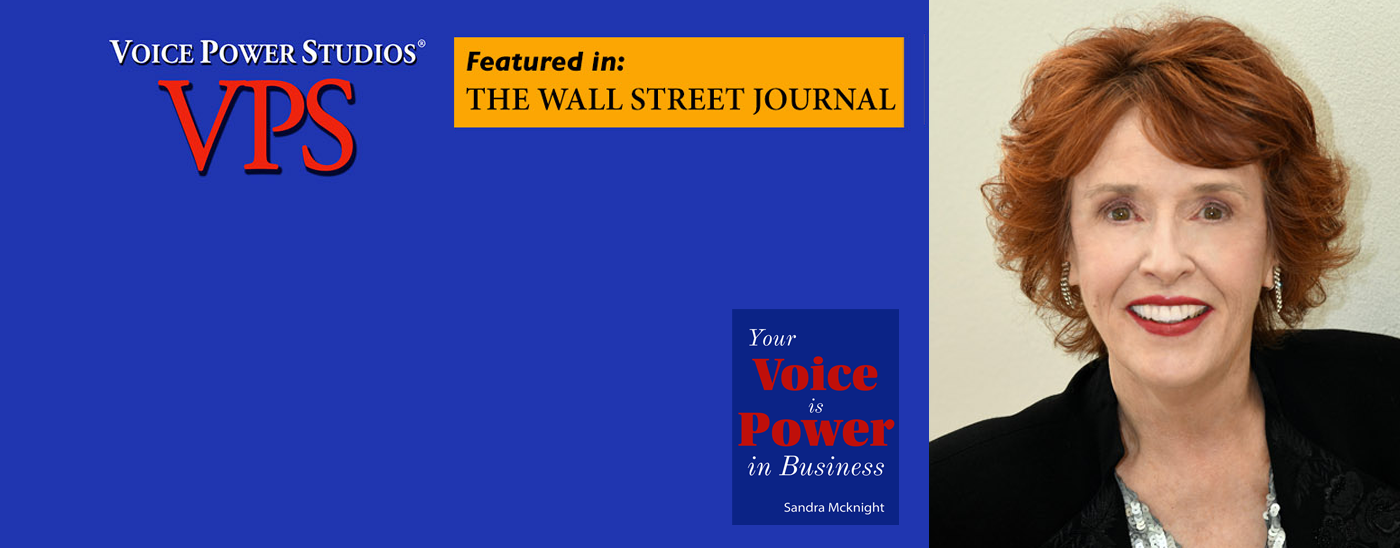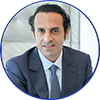We are living in complex and challenging times worldwide, and outstanding communication is more vital than ever to bring us together to work to solve both professional and personal issues.
I have prepared a free e-guide: The VPS e-Guide to Executive Presence: How to Speak like a CEO. Our e-Guide is a compilation of my interviews with several CEOs—all past or current clients—as well as eye-opening tips that I share for speaking with executive presence. The VPS e-Guide provides many insights and tips into speaking with executive presence, and (with even more) confidence, clarity, authority, and influence.
Executive presence isn't just a catch phrase or the latest trend. It's a real talent. And it's my belief, and the belief of executives I've coached, that it is definitelya learned asset. Executive presence isn't just something you're born with; it can be taught, it can be learned, it can be honed, and it can be passed on to others.
Featured Interviews:
Kyle Forster, Founder and CEO of “RunWhen.”
The Key to Your Executive Presence Is Your Speaking Voice
“Everything’s more informative, not just in terms of speaking; it deepens the level of interaction. Which is what executive presence is really all about: you have a deeper presence, you have a deeper connection, and people are going to remember you more, they’re going to be more likely to invest in you and listen to you and really hear what you’re telling them.”
 Richard Draper, Broadcast TV reporter, former Intel media manager & currently New Mexico State Director for a nationwide health system nonprofit
Richard Draper, Broadcast TV reporter, former Intel media manager & currently New Mexico State Director for a nationwide health system nonprofit
Zoom Talk: How to Speak More Clearly and Confidently in Virtual Meetings
“Voice is clearly one of the most powerful tools on a Zoom call or in videoconferencing that helps distinguish you; especially from others who have weaker personal presentation skills.”
Othman Ouenes, Founder and CEO of Fidari & Tech Entrepreneur
Finding Your Voice to Tell Your Story
“If you can articulate what you do, what you want, if you can talk in a way that’s confident, measured and intelligent, you can do anything.”
Sandra McKnight, CEO of Voice Power Studios and Host of The Celebrate Happiness Roadshow Podcast
Happy Voice, Happy People, Happy Bosses—Cementing that Relationship between Your Speaking Voice and Happiness
“Hearing happiness in the voice of another makes us pay more attention than even hearing happiness in our own voice.” Leadership consultant, Andrea Luoma
The VPS e-Guide to Executive Presence: How to Speak like a CEO is a gift toward a brighter year ahead and even the beginnings of a brighter and more informative career. Just click VPS e-Guide to download your copy. You will find our VPS e-Guide both enjoyable and informative. Please feel free to share it with your colleagues who could benefit as well.
For 35 years, Sandra, international Voice and Speech Coach, has trained business executives and entrepreneurs in executive presence, voice, speech, and accent improvement. To register for your 30-minute, no obligation voice analysis consult.https://www.voicepowerstudios.com/voice-analysis-consultation.html
Want to communicate more effectively? This Public Speaking Coach can help.


By Kevin Smith, San Gabriel Valley Tribune
Posted: 08/04/16, 8:13 PM PDT |
In the world of business, effective communication is key.
When a CEO or chief financial officer gets up to give a presentation, it’s imperative that the information be delivered clearly, concisely and with confidence.
But what if you end up racing through the presentation, glossing over key points and ultimately losing everyone’s attention?
That’s just one of many scenarios speaking coach Sandra McKnight is familiar with. McKnight offers speech coaching and accent reduction techniques to senior executives, sales managers, customer service representatives and others who want to become better communicators.
“A lot of people come to me because they had a performance review and were told that they speak too fast or that they’re not being clear,” she said. “They are not speaking succinctly and are talking around subjects. Sometimes they are repeating themselves and using filler words like ‘um’ ... and ‘OK’ because they’re not sure what they’re going to say next.”
Others might mumble or speak in a monotone voice thatt is guaranteed to put listeners to sleep.
Speaking coach, McKnight offers a variety of programs through her Voice Power Studios that are designed to correct those problems. She provided an overview of the most popular one.
“I offer eight sessions that are taught every two weeks over the telephone, so it’s highly convenient,” she said. “Each session is 75 minutes long. They call in and I record it and then send it to them afterward with a written summation.”
Clients are taught how to properly project and support their voice and how to speak at a pace that best conveys the information they are trying to present.
Robab Safa-Bakhsh, who manages technology research projects for Boeing, is one of McKnight’s clients. She frequently collaborates with others in and outside of her company in such locations as Southern California and Seattle.
“I’m from Iran and because of my heavy accent I needed to know how to pronounce words,” she said. “She also helped me with other aspects, such as voice control which is very important. I have a strong technical background and there are a lot of concepts I understand in my work, but I had a hard time communicating them. Sandra is very effective in what she does.”
Theater of Life Performance Skills Program for Executives
Theater of Life Performance Skills Program for Executives is a two-day private coaching program that teaches you, a successful leader, to be a persuasive, compelling presenter who energizes, motivates and inspires an audience to action. You will learn effective tools to both perfect your speech writing and to create a charismatic delivery style that hits the target every time.
Sandra McKnight, a leading expert in the art of voice and public speaking, a professional actress, and an international speaker suggests that combining voice, and performance techniques with presentation skills is what adds that extra energy and enthusiasm to your presentation style, and gives you the personal power to express your ideas clearly, confidently, powerfully and spontaneously in front of a live audience, on camera or on radio.
Her proven Performance Skills Program, Voice coaching and Speech coaching programs include techniques to free you of anxiety, teach you to take control of the room, to command your listeners’ attention and to sell your ideas to your clients, employees, stockholders and the public.
A Voice Analysis Consultation from Sandra, combined with video feedback teaches you how to:
- Develop your unique personal strengths
- Enhance your public presence
- Focus your persuasive power
- Energize and motivate your audience, and
- Give an outstanding performance
Learn to:
- Free yourself of anxiety and tension
- Take control of the non-verbal messages you communicate
- Convey your thoughts and emotions more accurately
- Use improvisation techniques be spontaneous, clever and witty
- Take your leadership space
- Use effective body language and movement
- Project a rich voice and with clear diction
- Incorporate eye sweep and facial gestures
- Use animation and to focus your energy
- Develop language and vocabulary skills
- Present in front of any type of audience
Partial Client List:
Northrop Grumman Corporation, Intel Corporation, Prudential Insurance, EDS Corp. Ernst and Young Inc., British Petroleum Group. Complete client list Click Here.
For complimentary telephone consultation email , (US) 1-505-466-6500
Testimonials
 "Sandra is a great coach and very skilled at bringing out the actor in us all. She opened my eyes to the potential that can be realized if speaking is performed in a way that connects with people through energy, personal emotion and voice. I look at my speeches in an entirely new way and the results have been very rewarding."
"Sandra is a great coach and very skilled at bringing out the actor in us all. She opened my eyes to the potential that can be realized if speaking is performed in a way that connects with people through energy, personal emotion and voice. I look at my speeches in an entirely new way and the results have been very rewarding."
Barry Ridgway, Regional Sales Director, Microsoft Corporation
"Sandra is a professional at ease with her coaching of voice power that helps a speaker make a lively connection between the speaker and audience. Her work transcends cultural differences with passion and joy."
Eva Wong, President, Top Human Technology Limited, Shanghai, China
 "Sandra has really helped me and others in our organization to get our messages across clearly and effectively to our people."
"Sandra has really helped me and others in our organization to get our messages across clearly and effectively to our people."
Keith Reese, Vice President, Intel Corporation
 "You brought out the actor in each of our presenters allowing them to develop a stage presence and confidence in their abilities without diminishing the message." Al Collie, Manager, Northrop Grumman Corporation.
"You brought out the actor in each of our presenters allowing them to develop a stage presence and confidence in their abilities without diminishing the message." Al Collie, Manager, Northrop Grumman Corporation.
For more information, please contact Voice Power Studios at sandram@voicepowerstudios or by phone at 1-505-466-6500
or fill out the contact information form below.
Scientists Analyze Public Leaders’ Voices to Discover the Basis for Charisma
PUBLISHED ONLINE In the Wall Street Journal - Original Blog

Researchers are discovering how charismatic leaders manipulate their vocal qualities to rouse people to action. WSJ's Robert Lee Hotz and Tanya Rivero discuss.
Photo: Getty
By ROBERT LEE HOTZ Dec. 1, 2014 5:16 p.m. ET
Scientists are tuning in on the power of the spoken word, seeking the secrets of charisma. By analyzing the harmonics of pitch, frequency and timbre, researchers at University of California, Los Angeles are discovering how charismatic public speakers use their voices to dominate, rouse and influence a large audience. They are finding that successful politicians in various countries, including Italy, France and Brazil, all share key vocal qualities that strongly affect how people respond to them, independent of the meaning of the words they say or the ideas they express.
In a separate analysis of some prominent business leaders, the researchers also found charismatic patterns in the public speeches of Apple Inc. Chief Executive Tim Cook and the late Steve Jobs.
Train Your Voice to Be More Charismatic
For speech experts, the voice is an instrument of rare persuasive power, tuned by evolution and culture to communicate far more than words alone convey. Some people are just born with the charismatic qualities that dominate or inspire trust, but voice researchers are confident that at least some of these acoustic elements can be taught.
You have the capacity to shape your voice in a way that makes people perceive you as a leader,” said UCLA acoustic scientist Rosario Signorello, who conducted the charisma experiments. He presented his work recently at the annual meeting of the Acoustic Society of America in Indianapolis. “It applies to politicians, to CEOs, to everyone who aspires to leadership status.
CORPORATE VOCAL CHORDS
Your voice can help or hinder your business career. Researchers at Duke University’s Fuqua School of Business analyzed speech patterns of 792 chief executives at major publicly held companies. Male CEOs with lower-pitched voices:
- Tended to manage larger companies.
- Made up to $187,000 a year more than higher-pitched peers.
- Lasted as many as five months longer as the head of a firm.
Of course, leadership in any field is more than just noise. Not all successful businessmen, for example, displayed charismatic patterns in public speeches, according to the researchers’ analysis.
In politics and business, public speaking is especially influential. Voters, for instance, tend to favor political candidates with deeper voices, several studies suggest. CEOs with lower-pitched voices typically manage larger firms, make more money and last longer on the job than higher-pitched peers, studies at Duke University’s Fuqua School of Business have found.
“There must be markers in your innate voice,” said Duke University accounting professor William Mayew, who studied how vocal pitch can affect employment prospects, firm management and the trustworthiness of financial reporting. “You don’t just get emotion, but you also get information about the type of person you are dealing with.”
These nonverbal signals can occasionally reveal more than intended. By analyzing speech samples of CEOs recorded during corporate earnings calls with investment analysts, Dr. Mayew identified involuntary vocal cues that signal the likelihood of financial misreporting.
The new research into charisma arises from efforts to understand the relationship between vocal acoustics and the psychology of perception. “Our voice transfers our essence to others,” said speech physiologist Bruce Gerratt at UCLA’s Voice Perception Laboratory. “Some of it is intentional, some of it is unconscious and some of it is biologic.”
Generally, researchers believe that the voice conveys volumes about social status and power, but efforts to document the acoustic profiles of such effects are controversial. Subtle changes in the biomechanical interplay of the throat, tongue, vocal folds and larynx, caused by disease, aging, stroke or injury, can alter the voice in subtle ways that, in turn, can change how listeners respond. But researchers investigating the psychology of acoustics haven’t yet been able to pin down cause and effect.
“How are these physical changes linked to perceptual changes?” said Jody Kreiman, an expert in voice perception at the UCLA David Geffen School of Medicine’s department of head and neck surgery who wasn’t involved in the charisma project. “Everybody says this is subjective and can’t be measured, but that’s nonsense.”
In his experiments, Dr. Signorello analyzed recordings of speeches by leaders speaking French, Italian and Portuguese, including François Hollande, the current president of France, and Luiz Inácio Lula da Silva, a former president of Brazil. He also studied speeches given by two Italian politicians, Umberto Bossi and Luigi de Magistris, and by former French President Nicolas Sarkozy.
To isolate acoustic properties, Dr. Signorello used a speech synthesizer to eliminate the actual meaning of the words being spoken. The frequency, intensity, cadence, duration and other vocal qualities remained intact.
Then, to understand how acoustic traits affected perceptions, Dr. Signorello and his colleagues asked 107 female and 26 male volunteers to rate a speaker’s charisma on a scale using 67 positive or negative adjectives, ranging from eloquent and bewitching to egocentric and menacing. To ensure that only perceptions of vocal qualities were measured, they also had the Italian speeches rated by 48 people who didn’t speak Italian, and the French speeches rated by 48 people who didn’t speak French.
Generally, someone speaking in a low-pitched voice is always perceived as big and dominant, while someone speaking in a high voice is perceived as small and submissive. When speaking to crowds, the political leaders typically stretched their voices to extremes, with a wide range of frequency variation, Dr. Signorello said.
“In the three languages, I see a similar pattern,” he said. “My research shows that charismatic leaders of any type in any culture tend to stretch their voice to the lower and higher limits during a public speech, which is the most important and risky context of communication for leadership,” he said.
These leaders adopted an entirely different tone when speaking to other high-ranking politicos or when the subject strayed from political topics. “They stretch their voice less when they speak to other leaders, keeping the vocal pitch very low. They stretch the voice limits even less when they speak about nonpolitical topics,” Dr. Signorello said.
In one experiment, he found he could change the way people perceived President Hollande of France by artificially dialing the pitch of his voice up or down.
Aspiring executives should take note, Dr. Signorello said. “The voice is a tool that can be trained,” he said. “Singers and actors train their voices to reach higher or lower frequencies. A leader-speaker should do the same.”
So far, he has only tested male voices. Given gender-based differences in the larynx and vocal folds, the characteristics of charisma he has identified so far may not apply to how women speak. He has started collecting speech samples for an analysis of female leaders.
Maybe there is a charismatic voice just for women,” Dr. Signorello said.
Deliberately lowering the voice to resemble the sound of a successful male voice, though, can backfire, Duke University’s Dr. Mayew discovered. Young women who adopted a distinctive low, guttural way of talking that linguists call “vocal fry” were perceived as less competent, less educated, less trustworthy, less attractive and less hirable.

 Richard Draper, Broadcast TV reporter, former Intel media manager & currently New Mexico State Director for a nationwide health system nonprofit
Richard Draper, Broadcast TV reporter, former Intel media manager & currently New Mexico State Director for a nationwide health system nonprofit


























